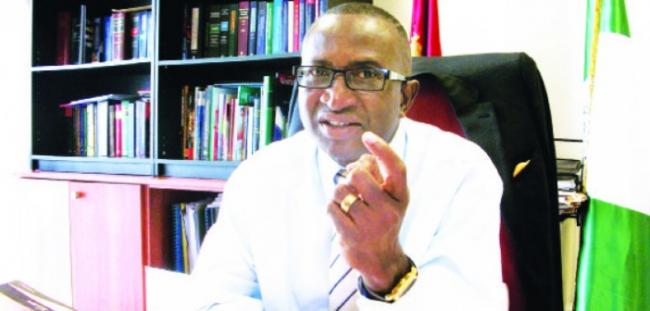


Nigerians foresee economic recovery as new ministers assume duty

AFTER nearly six months of near economic paralysis, with noticeable investor apathy and debilitating cash crunch, Nigerians yesterday expressed optimism that the nation’s economy will soon bounce back to life with the inauguration of the Federal Executive Council by President Muhammadu Buhari.
Hopes were high that part of the huge debts owed contractors would be released while other capital projects in various states will get some funding that will relax the strains in sectors of the economy.
Buhari, had Wednesday named Mrs. Kemi Adeosun as new Finance Minister who is expected to lead his economic team comprising experienced technocrats and politicians like Udoma Udo Udoma (Budget and National Planning); Babatunde Fashola (Power, Works and Housing); Rotimi Amaechi (Transport); Okechukwu Enelama (Industry, Trade and Investment); Kayode Fayemi (Solid Minerals); Ibe Kachikwu (Petroleum Resources); Audu Ogbe (Agriculture and Rural Development) and Adebayo Shittu (Communications) urging them to resuscitate the ailing economy and deliver on his party’s electoral promises.
Their optimism is coming against the background that Nigerian public sector remains the largest spender in the economy.
Since the crash in the global prices of crude oil in June of 2014 and its attendant dwindling incomes to Nigeria, many analysts have noted that for the Buhari’s government to make any meaningful impact on the economy in the next four years, Adeosun and her team would have an Herculean task of diversifying the economy away from its many years of overdependence on crude oil sales. For instance, recent data from the National Bureau of Statistics had indicated that Nigeria’s GDP responded to the world oil price slide with the second quarter (Q2) dipping by 1.61 per cent.
Agriculture, solid minerals, aviation, marine, and real sectors under the new divestment plan are expected to be rejigged with greater investments from both public and private sector flowing in.
President of the Manufacturers Association of Nigeria (MAN), Dr. Frank Jakobs, specifically said agriculture and solid minerals should be designated as key areas of focus by the new ministers as alternative sources of income given the declining revenue from the oil sector.
“The falling oil price globally calls for the diversification of the economy of the nation. The fall of oil prices means revenue available to the government will be minimal to the extent that the country can no longer meet its obligation to the citizens. Above all, we must look at the industries that derive their materials locally,” Jakobs noted.
Also commenting, President, Association of Licenced Telecommunications Operators of Nigeria (ALTON), Mr. Gbenga Adebayo, told Daily Sun that with the swearing in of new ministers, the dormancy, which has characterised the economy will fade away as fresh investments will begin to flow in as policies are enunciated and implemented by the cabinet ministers.
“Certainly, things will pick up in the economy. It could be slow, but then rightly, and I know that we will be heading in the right direction,” said Adebayo.
He, however, urged the ministers to engage stakeholders more often and not seek to run a monopoly in their respective ministries and build on the successes of their predecessors.
Similarly, President of the Association of Telecommunications Companies of Nigeria (ATCON), Mr. Lanre Ajayi, also noted that, “the communications sector will pick up slowly and grow stronger and meaningfully impact the economy.”
“The new Communications Minister, Mr. Adebayo Shittu, will however need to implement the broadband plan, which will make internet access available and affordable to all Nigerians,” said Ajayi.
Meanwhile, President of Nigerian Air Traffic Controllers Association (NATCO), Mr. Victor Eyaru, was delighted with the naming of ministers for the various sectors.
He, however, demanded that in some key aviation parastatals like the Nigerian Air Space Management Agency (NAMA), the minister should slash the over nine directorates to just three to save cost and ensure efficiency in service delivery.
Stable power supply remains a critical element for investments, that will be coming in and assisting in growing the economy. Operating with a paltry 3,800 megawatts capacity in an economy of 170 million people leaves much to be desired. Stakeholders in the power sector were obviously elated that the President has finally appointed former Lagos State Governor, Mr. Raji Fashola, as Power, Works and Housing Minister.
According to the Managing Director, Ikeja Electric, Mr. Abiodun Ajifowobaje, government must do all it can to protect power infrastructure assets from constant attacks by vandals while ensuring that gas is delivered to power plants to ensure steady electricity supply.
On the capital market, Managing Director of Cowry Asset Investment Company, a stockbroking firm, Mr. Johnson Chukwu, believes that the inauguration of President Muhammadu Buhari’s cabinet may not have immediate effect on the equities market.
This, according to him, was because market operators have already grown weary of waiting and would now respond only to positive policy pronouncements. Such pronouncements may, however, take some time to come as the Ministers will first understudy their ministries before evolving policies that would be appropriate to address the challenges of each individual ministry. It is only when positive announcements on the economic and policy direction of the government are made that the capital market will respond in similar direction.
Source: Daily Sun
Share this post
Naijanetwork Forum Statistics
Threads: 14843,
Posts: 17902,
Members: 6711


